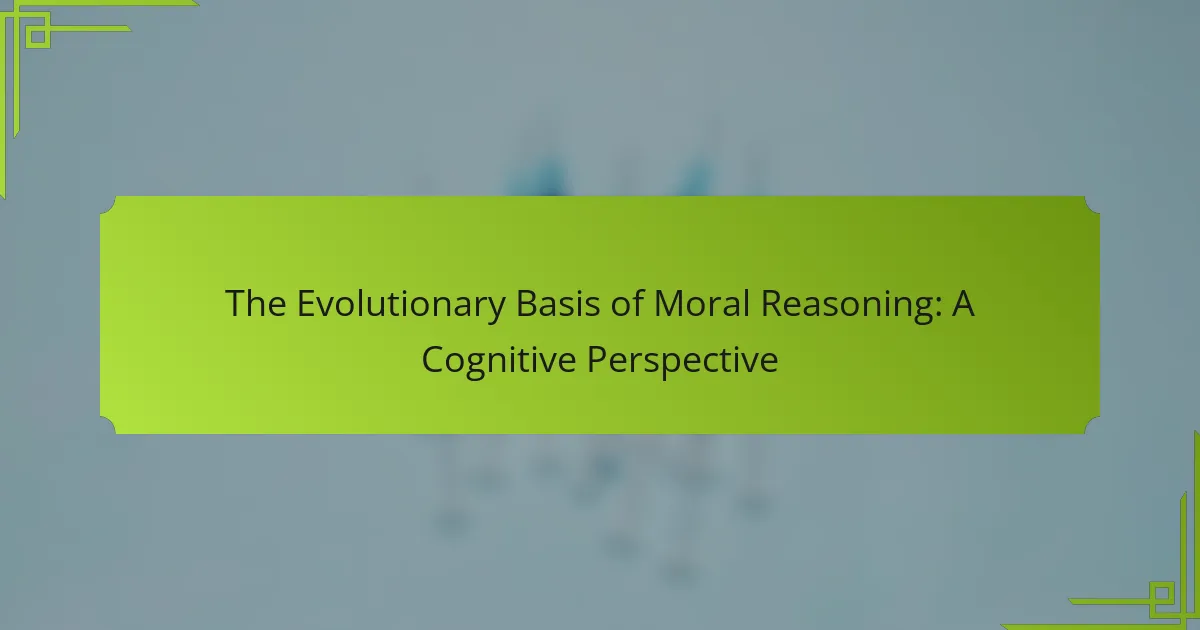Understanding the evolutionary basis of moral reasoning reveals how our cognitive processes shape ethical behavior and social interactions. This article explores the development of moral behaviors for social cohesion, the universal and unique attributes of moral reasoning across cultures, and the impact of cognitive growth on moral judgments. Additionally, it examines how moral reasoning influences contemporary society and offers strategies for enhancing ethical decision-making.
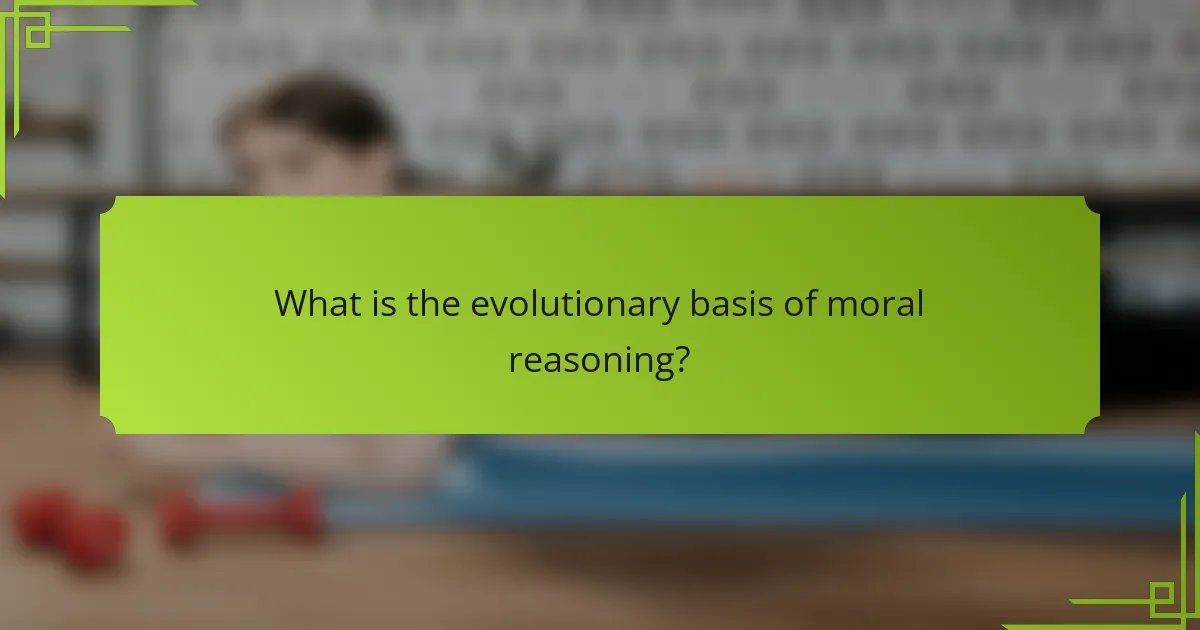
What is the evolutionary basis of moral reasoning?
The evolutionary basis of moral reasoning suggests that moral behaviors developed to enhance social cohesion and cooperation among groups. These behaviors likely provided survival advantages by fostering trust and reducing conflict. Research indicates that empathy and altruism are rooted in our evolutionary past, promoting group survival and reproductive success. Additionally, moral reasoning may have evolved as a cognitive tool to navigate complex social environments, allowing individuals to make decisions that benefit both themselves and their communities.
How does cognitive science explain moral reasoning?
Cognitive science explains moral reasoning as an evolved cognitive process influenced by social interactions and environmental factors. This perspective emphasizes that moral reasoning is not purely rational but shaped by emotions and cultural contexts. Research indicates that moral judgments often arise from intuitive processes, which are then rationalized by reasoning. This dual-process model suggests that both emotional responses and cognitive deliberation play crucial roles in how individuals navigate moral dilemmas. Understanding this interplay can enhance insights into moral development and ethical decision-making.
What role does evolution play in shaping moral frameworks?
Evolution significantly influences moral frameworks by shaping innate social behaviors and cognitive processes. Natural selection promotes cooperation and altruism, essential for group survival. These traits form the basis of moral reasoning, allowing societies to develop shared ethical standards. Research indicates that humans possess an evolutionary predisposition for empathy and fairness, which guide moral judgments. This cognitive perspective highlights how evolutionary pressures have crafted the moral landscape we navigate today.
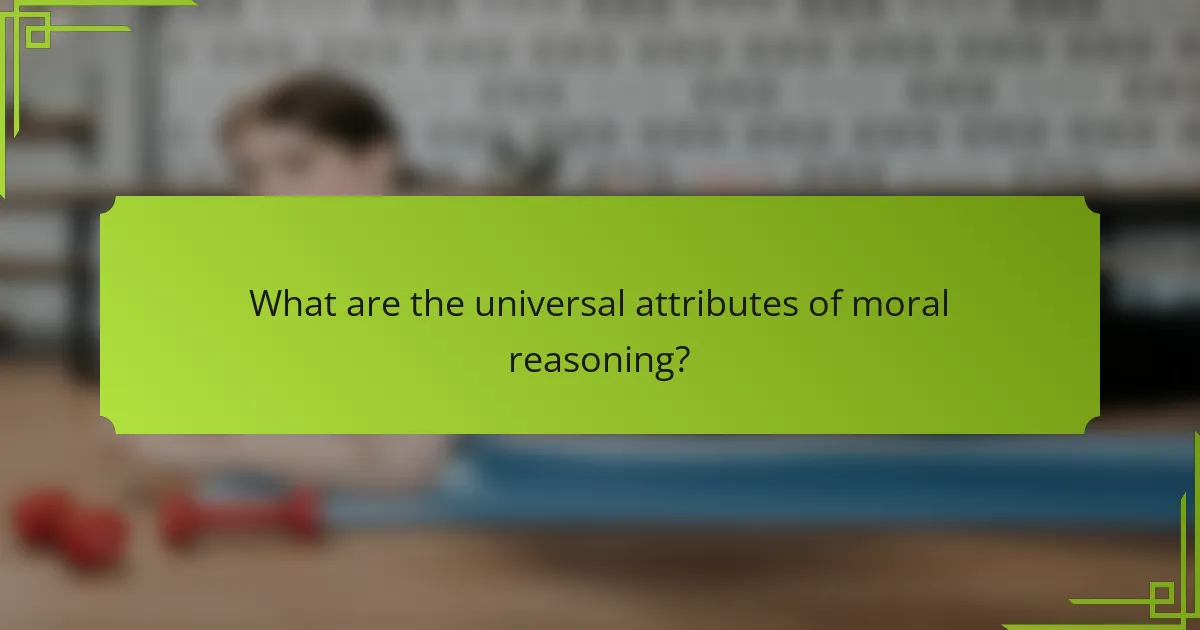
What are the universal attributes of moral reasoning?
The universal attributes of moral reasoning include fairness, empathy, social cooperation, and the ability to evaluate consequences. These attributes form the foundation of moral judgments across cultures. Fairness ensures equitable treatment, while empathy fosters understanding of others’ feelings. Social cooperation promotes group harmony, and evaluating consequences aids in assessing the impact of actions. Each attribute contributes to a comprehensive framework for moral reasoning.
How do empathy and cooperation influence moral decisions?
Empathy and cooperation significantly enhance moral decision-making by fostering understanding and collaboration. Empathy allows individuals to recognize and share the feelings of others, promoting altruistic behavior. Cooperation encourages collective action, leading to ethical outcomes that benefit the group. Research shows that these traits are rooted in evolutionary processes, enhancing social cohesion and survival. As a result, moral decisions often reflect the balance between self-interest and the welfare of others.
What cognitive processes are involved in moral judgment?
Cognitive processes involved in moral judgment include emotional responses, reasoning, and social intuition. Emotions shape moral decisions by influencing how individuals perceive right and wrong. Reasoning allows for the evaluation of consequences and ethical principles. Social intuition provides quick assessments based on cultural norms and shared values. These processes work together to form a comprehensive framework for moral reasoning, helping individuals navigate complex ethical dilemmas.
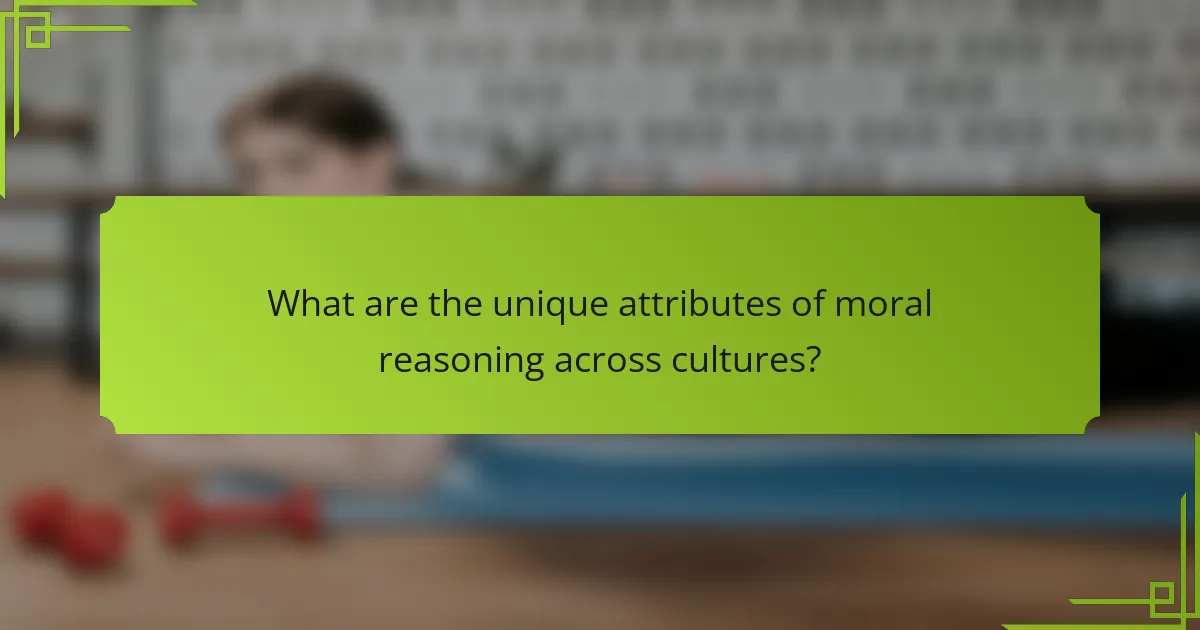
What are the unique attributes of moral reasoning across cultures?
Moral reasoning exhibits unique attributes across cultures, shaped by diverse social norms and values. These attributes include varying emphasis on individualism versus collectivism, which influences moral judgments. For example, Western cultures often prioritize personal rights, while collectivist cultures may focus on community welfare. Additionally, cultural narratives and historical contexts shape moral frameworks, leading to distinct interpretations of concepts like justice and fairness. These variations highlight the adaptability of moral reasoning, reflecting the unique sociocultural landscapes in which they evolve.
How do cultural norms impact moral reasoning?
Cultural norms significantly shape moral reasoning by influencing values and ethical standards. These norms provide a framework for individuals to evaluate right and wrong, impacting decision-making processes. For instance, collectivist cultures prioritize group harmony, which can lead to different moral conclusions than individualistic cultures that emphasize personal rights. This variation illustrates the unique attribute of moral reasoning, where context and societal expectations play crucial roles. As a result, understanding cultural influences is essential for comprehending the complexities of moral judgments across diverse societies.
What are the differences in moral reasoning between individualistic and collectivist societies?
Individualistic societies prioritize personal autonomy, while collectivist societies emphasize group harmony. Individualistic moral reasoning focuses on personal rights and justice, whereas collectivist reasoning values community welfare and social obligations. This fundamental difference shapes ethical perspectives and decision-making processes. Individualistic cultures may encourage self-assertion, while collectivist cultures promote consensus and interdependence. Understanding these distinctions reveals how cultural context influences moral frameworks and behaviors.
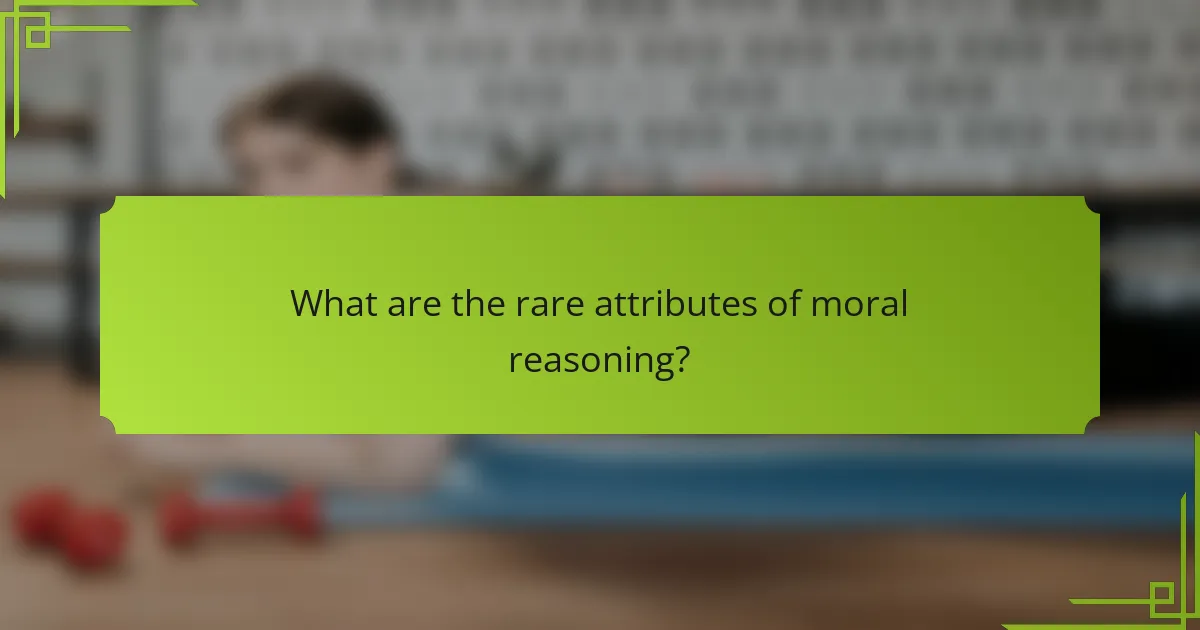
What are the rare attributes of moral reasoning?
The rare attributes of moral reasoning include cultural variability, individual cognitive styles, and the influence of emotional intelligence. Cultural variability can lead to differing moral frameworks and judgments across societies. Individual cognitive styles affect how people process moral dilemmas, resulting in unique reasoning patterns. Emotional intelligence can enhance moral reasoning by allowing individuals to empathize deeply with others and consider emotional factors in ethical decisions.
How do neurological conditions affect moral reasoning?
Neurological conditions can significantly impair moral reasoning by altering cognitive functions. These conditions may affect empathy, decision-making, and social cognition. For instance, individuals with damage to specific brain regions, such as the prefrontal cortex, often struggle with moral judgments. This highlights the unique attribute of brain structure’s influence on ethical considerations. Research indicates that conditions like autism spectrum disorder can lead to atypical moral reasoning, showcasing the variability in moral frameworks shaped by neurological differences. Understanding these impacts is crucial for developing supportive interventions.
What unique moral dilemmas arise in specific contexts?
Unique moral dilemmas often arise in contexts like cultural differences, technological advancements, and environmental challenges. For example, cultural practices may conflict with universal human rights, creating ethical tensions. In technology, issues like privacy versus security present dilemmas that challenge traditional moral frameworks. Environmental concerns often force choices between economic growth and sustainability, highlighting the complexity of moral reasoning. Each context demands a nuanced understanding of values and consequences, reflecting the evolutionary basis of moral reasoning.
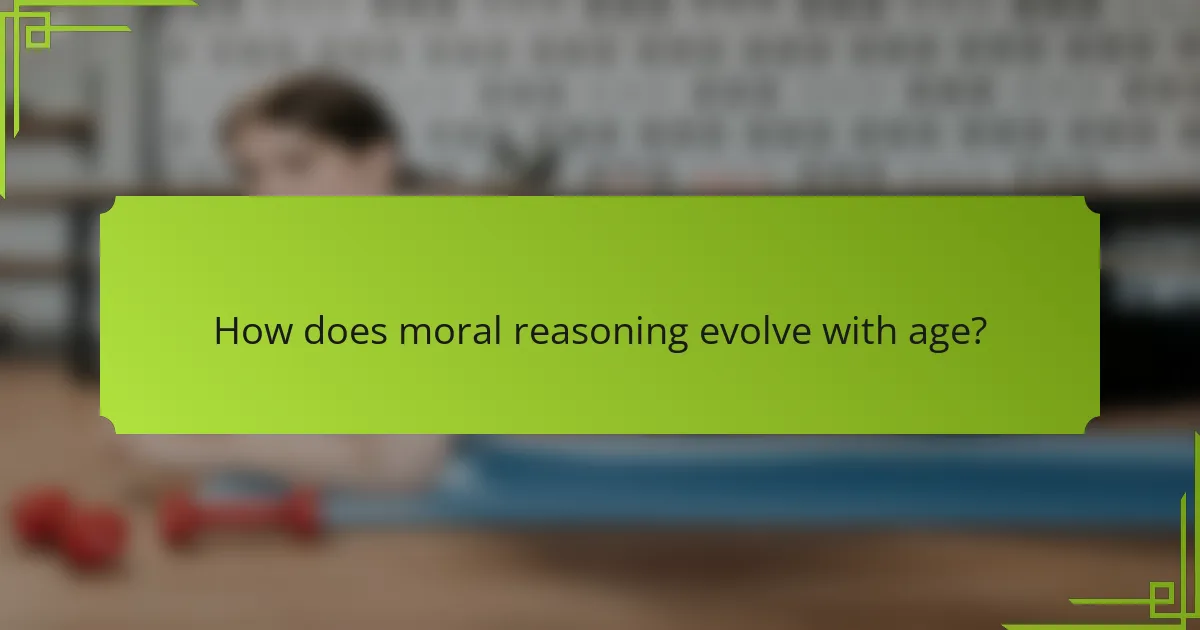
How does moral reasoning evolve with age?
Moral reasoning evolves with age, becoming more sophisticated and nuanced. As individuals mature, they develop a deeper understanding of ethical principles and the complexities of moral dilemmas.
In early childhood, moral reasoning is largely influenced by external authority and immediate consequences. As children grow, they begin to consider intentions and the broader social context of actions. Adolescents often engage in more abstract thinking, weighing rights and responsibilities.
By adulthood, moral reasoning typically reflects a blend of personal values and societal norms, allowing for more empathetic and principled decision-making. Research shows that older adults often exhibit a greater capacity for moral reasoning, emphasizing compassion and justice.
This evolution highlights the interplay between cognitive development and moral understanding, suggesting that life experiences significantly shape moral perspectives over time.
What changes occur in moral reasoning from childhood to adulthood?
Moral reasoning evolves significantly from childhood to adulthood, becoming more complex and nuanced. Children often rely on concrete rules and authority figures to determine right and wrong, while adults develop the ability to consider multiple perspectives and the context of moral dilemmas.
In childhood, moral reasoning is typically characterized by a focus on obedience and punishment, as children learn to navigate social norms. As individuals transition into adulthood, they begin to incorporate principles of justice, empathy, and social contracts, allowing for a more sophisticated understanding of morality.
Research indicates that adults are more likely to engage in principled reasoning, weighing the consequences of their actions and considering the welfare of others. This shift reflects a unique attribute of adult moral reasoning: the capacity for abstract thought and ethical deliberation, which is less pronounced in children.
Overall, the evolution of moral reasoning is marked by a transition from a simplistic, rule-based approach to a more intricate, context-sensitive framework that values empathy and ethical principles.
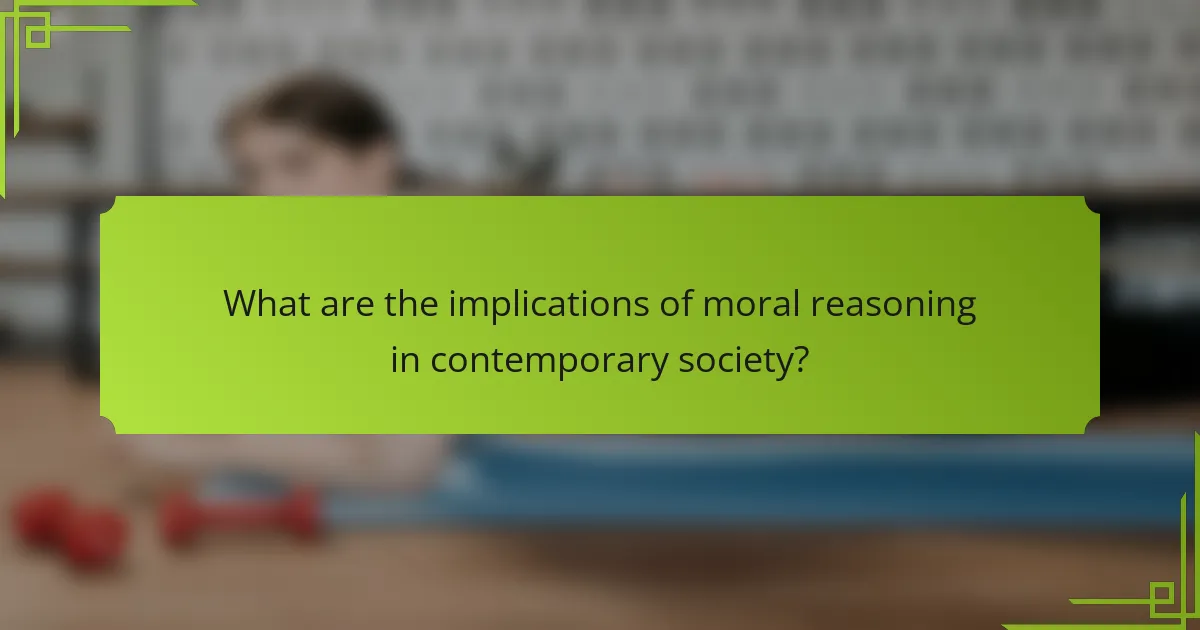
What are the implications of moral reasoning in contemporary society?
Moral reasoning significantly influences contemporary society by shaping ethical frameworks and guiding decision-making. It fosters social cohesion and promotes justice through shared values. The evolutionary basis of moral reasoning suggests that cognitive development and social interactions have led to complex moral systems. These systems adapt to cultural contexts, affecting laws, policies, and interpersonal relationships. Understanding moral reasoning’s implications can enhance societal discourse and address ethical dilemmas effectively.
How can understanding moral reasoning improve conflict resolution?
Understanding moral reasoning enhances conflict resolution by fostering empathy and perspective-taking. It allows individuals to analyze differing viewpoints and recognize underlying values. This cognitive approach promotes collaboration and reduces misunderstandings. By applying moral reasoning, parties can navigate disputes more effectively, leading to constructive outcomes.
What strategies can enhance moral reasoning in educational settings?
Integrating strategies that enhance moral reasoning involves fostering critical thinking, empathy, and ethical discussions. Encouraging collaborative learning environments promotes diverse perspectives, which can deepen understanding of moral dilemmas.
Incorporating real-world scenarios into lessons allows students to apply moral reasoning in practical contexts. Role-playing exercises can also help students experience different viewpoints, enhancing their ability to empathize with others.
Promoting reflective practices, such as journaling or group discussions, encourages students to articulate their moral beliefs and challenge their assumptions. This process strengthens their moral reasoning skills by fostering self-awareness and critical evaluation of their values.
Lastly, integrating interdisciplinary approaches can enrich moral reasoning. For example, combining insights from psychology, philosophy, and sociology provides a comprehensive framework for understanding moral issues, thus enhancing students’ cognitive abilities in ethical reasoning.
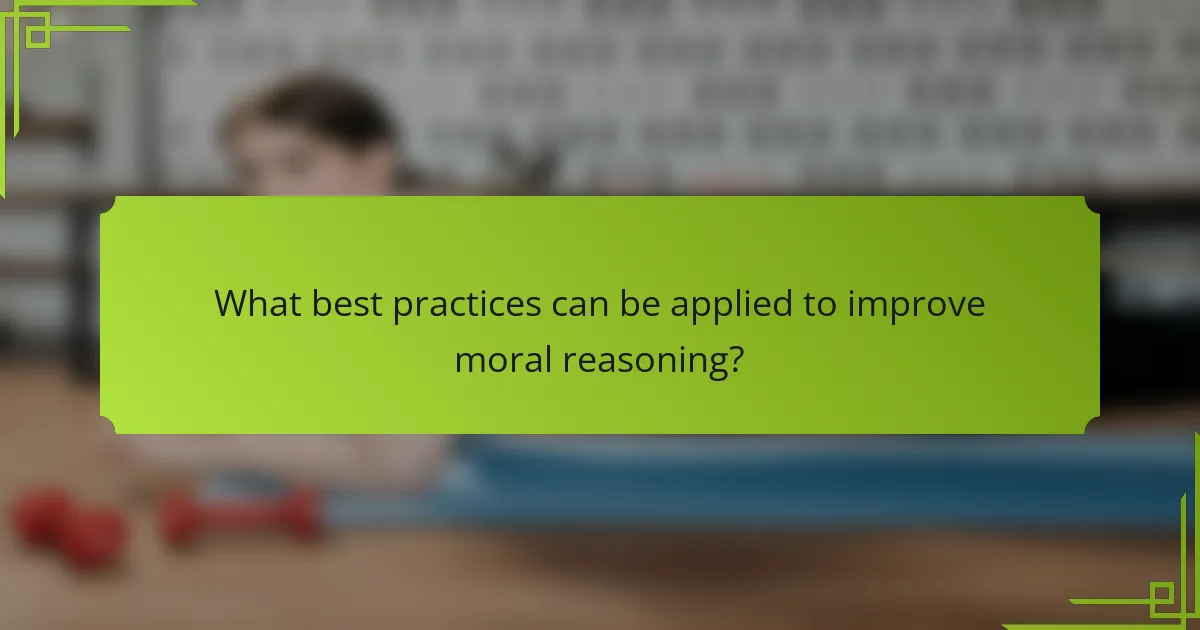
What best practices can be applied to improve moral reasoning?
To improve moral reasoning, individuals can practice empathy, engage in perspective-taking, and analyze ethical dilemmas critically. These strategies enhance cognitive flexibility and understanding of diverse viewpoints.
1. Empathy: Develop the ability to understand and share the feelings of others, fostering moral sensitivity.
2. Perspective-taking: Actively consider situations from multiple viewpoints to broaden understanding of moral implications.
3. Critical analysis: Evaluate ethical dilemmas by examining consequences, principles, and stakeholder impacts, promoting deeper moral insight.
4. Open dialogue: Engage in discussions about moral issues to refine reasoning and challenge assumptions.
How can individuals cultivate better moral decision-making skills?
Individuals can cultivate better moral decision-making skills through self-reflection and understanding cognitive biases. Engaging in discussions about ethical dilemmas enhances awareness of diverse perspectives. Practicing empathy by considering the feelings of others strengthens moral reasoning. Additionally, studying moral philosophy can provide frameworks for evaluating complex situations. Regularly applying these strategies fosters a more nuanced approach to moral choices.
What common mistakes should be avoided in moral reasoning?
Common mistakes in moral reasoning include overgeneralizing from personal experiences, neglecting cultural contexts, and failing to consider the consequences of actions. These errors can lead to biased judgments and hinder effective decision-making. Additionally, individuals may overlook the complexity of moral dilemmas, simplifying them to binary choices. This reductionist approach can result in flawed reasoning and ethical missteps. Recognizing these pitfalls is essential for developing a nuanced understanding of morality.
